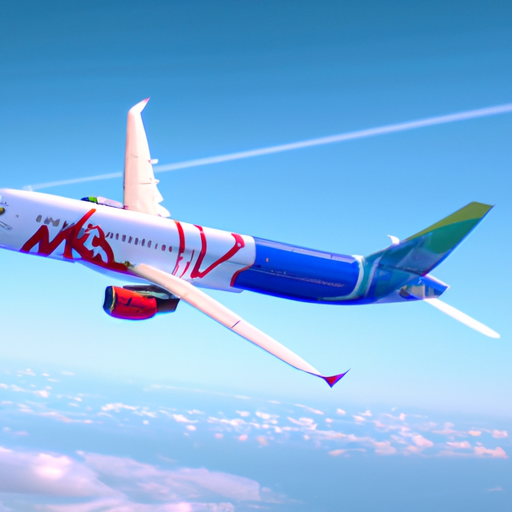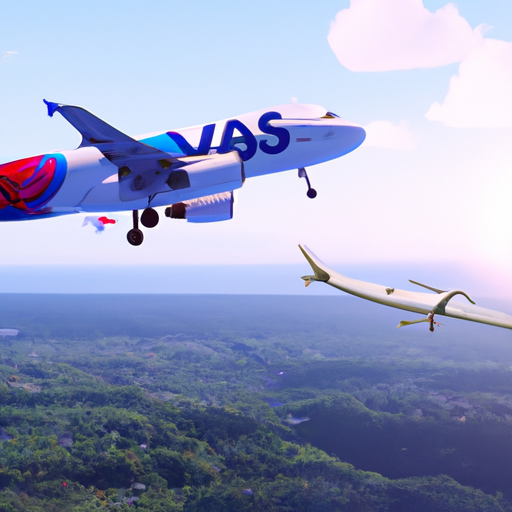
Viva Aerobus and Airbus: A New Partnership for 90 A321neo Aircraft
Viva Aerobus, a Mexican low-cost carrier, has recently announced a new partnership with Airbus, the renowned aircraft manufacturer. The two companies have signed a Memorandum of Understanding (MOU) for the purchase of 90 A321neo aircraft. This exciting collaboration marks a significant milestone for both Viva Aerobus and Airbus, as they join forces to enhance the airline’s fleet and expand its operations.
The A321neo is a state-of-the-art aircraft that offers numerous benefits to airlines and passengers alike. With its advanced technology and fuel-efficient engines, the A321neo promises reduced operating costs and lower carbon emissions. This makes it an ideal choice for Viva Aerobus, which is committed to sustainability and environmental responsibility. By adding these aircraft to its fleet, the airline can further reduce its carbon footprint and contribute to a greener aviation industry.
Moreover, the A321neo’s spacious cabin design provides enhanced comfort for passengers. With a wider fuselage and larger overhead storage bins, travelers can enjoy a more pleasant flying experience. The aircraft also boasts the latest in-flight entertainment systems and connectivity options, ensuring that passengers stay entertained and connected throughout their journey. This focus on passenger satisfaction aligns perfectly with Viva Aerobus’ commitment to delivering exceptional service and value to its customers.
The partnership between Viva Aerobus and Airbus is not only beneficial for the two companies involved but also for the Mexican aviation industry as a whole. The purchase of 90 A321neo aircraft will create numerous job opportunities and stimulate economic growth in the region. It will also enable Viva Aerobus to expand its route network and offer more destinations to its customers. This increased connectivity will not only benefit travelers but also boost tourism and trade in Mexico.
Furthermore, the A321neo’s long-range capabilities make it an excellent choice for Viva Aerobus’ expansion plans. The aircraft can fly non-stop to destinations across North, Central, and South America, opening up new markets and opportunities for the airline. This will allow Viva Aerobus to tap into previously untapped markets and attract a wider customer base. With its affordable fares and high-quality service, the airline is well-positioned to capture a significant share of the growing demand for air travel in the region.
The partnership between Viva Aerobus and Airbus is a testament to the airline’s commitment to growth and innovation. By investing in the latest aircraft technology, Viva Aerobus is positioning itself as a leader in the Mexican aviation industry. The addition of 90 A321neo aircraft to its fleet will not only enhance the airline’s operational efficiency but also enable it to offer an even better travel experience to its customers.
In conclusion, the partnership between Viva Aerobus and Airbus for the purchase of 90 A321neo aircraft is an exciting development for both companies. The A321neo’s advanced technology, fuel efficiency, and passenger comfort make it an ideal choice for Viva Aerobus’ expansion plans. This collaboration will not only benefit the two companies involved but also contribute to the growth of the Mexican aviation industry. With its commitment to sustainability and customer satisfaction, Viva Aerobus is well-positioned to capitalize on the opportunities presented by this new partnership.
Exploring the Benefits of Viva Aerobus’ Investment in Airbus A321neo

Viva Aerobus, a Mexican low-cost airline, has recently signed a Memorandum of Understanding (MOU) with Airbus for the purchase of 90 A321neo aircraft. This significant investment marks a new chapter for Viva Aerobus, as it aims to expand its fleet and enhance its operations. In this article, we will explore the benefits of Viva Aerobus’ decision to invest in the Airbus A321neo.
First and foremost, the Airbus A321neo is known for its fuel efficiency. With rising fuel costs being a major concern for airlines, the A321neo’s advanced technology and design allow for significant fuel savings. This translates into lower operating costs for Viva Aerobus, enabling the airline to offer competitive fares to its customers. By investing in the A321neo, Viva Aerobus is not only ensuring its own profitability but also making air travel more affordable for passengers.
Furthermore, the A321neo offers increased capacity compared to its predecessors. With a seating capacity of up to 240 passengers, the A321neo allows Viva Aerobus to transport more passengers per flight. This is particularly advantageous for popular routes where demand is high. By maximizing the number of passengers carried, Viva Aerobus can increase its revenue and improve its overall profitability. Additionally, the A321neo’s spacious cabin design provides a comfortable and enjoyable flying experience for passengers, further enhancing Viva Aerobus’ reputation as a customer-centric airline.
Another benefit of the A321neo is its range. With a maximum range of approximately 4,000 nautical miles, the A321neo opens up new possibilities for Viva Aerobus to expand its route network. The airline can now consider long-haul flights to destinations previously inaccessible with its current fleet. This not only allows Viva Aerobus to tap into new markets but also provides more travel options for its customers. Whether it’s a business traveler looking for convenient connections or a leisure traveler seeking new adventures, the A321neo enables Viva Aerobus to cater to a wider range of passenger needs.
In addition to its operational advantages, the A321neo is also environmentally friendly. With reduced fuel consumption and lower emissions, the A321neo aligns with Viva Aerobus’ commitment to sustainability. As the aviation industry faces increasing pressure to reduce its carbon footprint, investing in fuel-efficient aircraft like the A321neo demonstrates Viva Aerobus’ dedication to environmental responsibility. By choosing the A321neo, Viva Aerobus is not only investing in its own future but also contributing to a greener and more sustainable aviation industry.
In conclusion, Viva Aerobus’ decision to invest in 90 Airbus A321neo aircraft brings numerous benefits to the airline. From fuel efficiency and increased capacity to extended range and environmental sustainability, the A321neo enhances Viva Aerobus’ operations and positions the airline for future growth. As Viva Aerobus continues to expand its fleet and improve its services, passengers can look forward to more affordable fares, greater travel options, and a more sustainable flying experience. With this exciting partnership between Viva Aerobus and Airbus, the future of air travel in Mexico looks brighter than ever.
The Implications of Viva Aerobus’ MOU with Airbus for the Aviation Industry
Viva Aerobus, a Mexican low-cost carrier, has recently signed a Memorandum of Understanding (MOU) with Airbus for the purchase of 90 A321neo aircraft. This agreement has significant implications for the aviation industry, as it not only demonstrates Viva Aerobus’ commitment to expanding its fleet but also highlights the growing demand for more fuel-efficient and environmentally friendly aircraft.
The MOU between Viva Aerobus and Airbus is a testament to the airline’s ambitious growth plans. With the addition of 90 A321neo aircraft, Viva Aerobus aims to strengthen its position in the Mexican market and expand its route network to serve more destinations. This move is in line with the airline’s strategy to offer affordable air travel options to a wider customer base.
The choice of the A321neo aircraft is a strategic one for Viva Aerobus. This model is known for its fuel efficiency and reduced carbon emissions, making it an environmentally friendly option. As the aviation industry faces increasing pressure to reduce its carbon footprint, airlines like Viva Aerobus are taking proactive steps to invest in more sustainable aircraft. This not only aligns with their corporate social responsibility goals but also helps them stay ahead of regulatory requirements.
The implications of Viva Aerobus’ MOU with Airbus extend beyond the airline itself. This agreement sends a strong signal to other airlines in the industry that investing in fuel-efficient aircraft is not only environmentally responsible but also financially beneficial. As more airlines follow suit and opt for greener aircraft, it will create a ripple effect that will drive manufacturers to prioritize the development of more sustainable aviation solutions.
Furthermore, the partnership between Viva Aerobus and Airbus highlights the importance of collaboration in the aviation industry. By working together, airlines and aircraft manufacturers can leverage their respective expertise to drive innovation and address the challenges facing the industry. This MOU serves as a prime example of how collaboration can lead to mutually beneficial outcomes, benefiting both the airline and the manufacturer.
In addition to the environmental and collaborative implications, Viva Aerobus’ MOU with Airbus also has economic implications. The purchase of 90 A321neo aircraft represents a significant investment for the airline, signaling its confidence in the future of the aviation industry. This investment will not only create job opportunities but also contribute to the economic growth of the regions where Viva Aerobus operates.
Overall, Viva Aerobus’ MOU with Airbus has far-reaching implications for the aviation industry. It demonstrates the airline’s commitment to growth and sustainability, while also setting an example for other airlines to follow. The partnership between Viva Aerobus and Airbus showcases the power of collaboration and highlights the economic benefits of investing in fuel-efficient aircraft. As the industry continues to evolve, it is crucial for airlines and manufacturers to prioritize sustainability and work together to shape a more environmentally friendly future for aviation.


